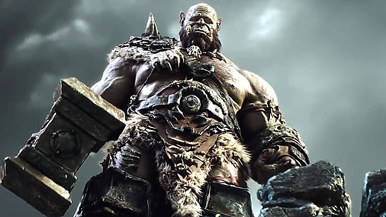Movie Review: Warcraft
By Ben Gruchow
June 14, 2016
BoxOfficeProphets.com

And then came the porcine and overproduced Hobbit prequels, Clash/Wrath of the Titans, and many more, and just this past February Gods of Egypt arrived to make sure that the genre was still on life support. And last but not least, Universal and Blizzard arrive to give us Warcraft, and at $160 million, it is a histrionically expensive cross-breed of two genres: medieval fantasy and video game adaptation, and it's tough to tell which one has historically been more maligned and which one has the more fickle audience. And like the desperate garnish on top of a thrown-together stew, this one's also been in turnaround for 10 years or so; once production got underway, the director's wife was diagnosed with cancer. His father was David Bowie. These are not the ingredients that make a creatively fulfilling filmmaking experience, nor portend a creatively confident final product.
Warcraft is not a good movie, but it at least avoids being a total wipeout in the manner of something like Dungeons & Dragons; unfortunately, it also avoids “delightfully wretched”, which is sort of what you want if actually being good isn't in the cards. It succeeds just well enough on the basis of visual effects (the bulk of which are pretty fantastic) and set design to put you in the mood for a real movie, and it's a big enough mess with its pacing and editing to throw you out of each moment over and over again. The kiss of death is its story and characters; they are so simultaneously transparent and jumbled that they almost cancel each other out and leave us with nothing; to witness these individuals execute long stretches of inconsequential utterances and movement is to experience anhedonia by proxy.
There was clearly an impetus here to do right by the source material; the Warcraft IP is, at its best, engaging and snarky mythmaking. That mythology is here, if you really know where to look. This was written by Charles Leavitt and Duncan Jones and directed by Jones, and it appears that so much of their time and effort went into making sure that all pieces were in place synergistically that there was little left over for making the movie work in its own right as anything within shouting distance of dramatic cinema. Here is what I know. There are orcs (the Horde) who have destroyed their homeland and been corrupted by evil; they open a gateway into the unspoiled world of Azeroth and proceed to invade.
Some of the orcs are good, though, and realize the error of their ways. Meanwhile, there are humans (the Alliance) in Azeroth who are good, and try to defeat the orcs from taking over their world. Some of the humans are corrupted by evil, though, and conspire to help the orcs win. These orcs and humans are played or voiced by actors, some successfully (Daniel Wu is Gul'Dan, the main orc antagonist), some not so (Ben Foster plays his Guardian as if auditioning for the concept of a fantasy film, rather than an actual one; Paula Patton plays a half-breed caught between the Horde and the Alliance, but her most formidable struggle is enunciating through the god-awful prosthetic tusks she's given to wear).
That's it, really; the major parts of the story never really get any deeper or more textured than that, and the little parts evaporate from memory almost as soon as they occur. There's a reason why I've spent so much space talking about the circumstances that led to this film's existence, rather than the film itself; it's telling that I saw the film less than 24 hours ago, and I struggle to remember anything about the dialogue, the character development, or the way the movie ends. After the fact, it has the feel of seeing yourself in a picture at an event you don't much remember going to.
In the moment, it's like attending an advanced lecture on a subject that you don't understand. For all of what I've written above about the simplicity and airiness of the movie's actual content, it's the most narratively impenetrable and dysfunctional thing of its type since Silent Hill. All throughout the film, characters pause and give ominous pronouncements and statements and backstory tidbits, and there are endless references made regarding saving/eradicating one's land or people or kind or type, and it's rather shocking how little of it sticks, and how little context is put into place for any audience member not intimately familiar with the existing source material's storyline. I am casually familiar with the game's universe and I was adrift for most of the running time; best of luck to you if you walk into this film totally ignorant of the source material.
The movie scores a solid hit on the visuals, as mentioned. It's wall-to-wall with CGI, mostly involving the humanoid but distinctly mythical orcs; they look convincing within the demands of the film's universe, even if they don't look particularly “real” in any sense. Equally evocative is the production design, which achieves the tricky feat of building a universe mostly in the background; what happens in Azeroth may be fuzzy, but it's easy to imagine a good movie being made in this sandbox. There are those isolated moments where we're reminded of the director's talent for giving a moment time to stretch out and let suspense and implication build naturally. This is symptomatic of the norm for medieval fantasy currently, then: isolated moments of vision and promise, mostly untethered to a messy and ill-defined series of conflicts and skirmishes.